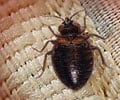In a new research it has been found that the impact of GM wheat plants on insects is at negligible rate.

A concern related to genetically modified plants is that while they may not just affect the disease or pest to which they are meant to be resistant, but may also have negative effects on other valued, non-target species.
"The main conclusion in a nut shell is that while genetic modification has considerable ecological effects, the differences between the GM wheat strains and their non-GM counterparts are similar to the differences we find between different conventional (non-GM) wheat strains. Moreover, these differences were not consistent between the two study years," said van Veen.
"So, within this context, there appear to be no ecological problems associated with the genetically-modified wheat lines tested in this study."
In the study, the team compared the networks of feeding interactions of three species of herbivores that feed on the wheat, primary parasitoid wasps (eight species) that feed on the herbivores and secondary parasitoid wasps (13 species) that feed on the primary parasitoids.
Von Burg added, "It is interesting to see that plant traits can affect the ecological community all the way up to the 4th trophic level, three feeding links removed from the plant, something which has been reported for several plant species now."
Advertisement
Source-ANI

![Genetically Modified Food / Genetically Modified Organism [GMO] Genetically Modified Food / Genetically Modified Organism [GMO]](https://images.medindia.net/patientinfo/120_100/Genetically-Modified-Food.jpg)










